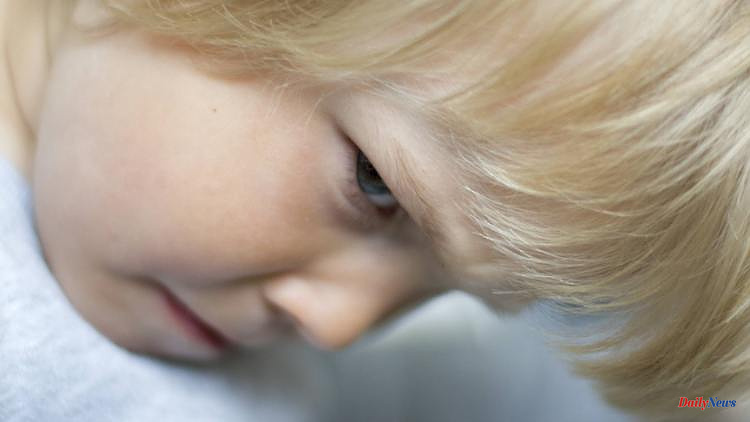Tantrums, contradiction, refusal: children need this phase from the age of two years, often called "defiance phase", on the way to independence. But parents often bring them to the brink of despair. But if you act correctly during this time, the children will benefit from it - also later in life.
Your child runs away instead of putting on the jacket? Cries when it doesn't get what it wants? Between the ages of two and six, simple situations can trigger violent defiance. For parents, the autonomy phase, as the period of early independence is called, is often stressful. How do you react to tantrums? And how can children learn to deal with emotional outbursts? A few expert tips.
Children know early on what they want. And they make that clear. "Despite it starts in infancy," explains the educator and author Susanne Mierau. For example, if it turns away and doesn't want to be wrapped, says the expert. You still manage to distract the baby. From the age of two it becomes more difficult. Language is added, the children become stronger and have more motor skills. A loud "No" or "I don't want to" can no longer be overheard.
"The high phase of autonomy efforts is three to four years," says Sebastian Arnold from the Professional Association of Child and Adolescent Psychotherapists (BKJ). "Children learn during this time that they have their own will and can decide, but they reach their limits in their expression." Parents should accompany the phase well. Because "how children go through it has an impact on life as a whole," says Mierau.
Accept anger - the child cannot do otherwise
Frustration and disappointment are part of the everyday life of small children, where many new things are discovered. "The brain is still maturing," says Arnold. Children first have to learn to deal with their feelings. "An act of defiance is like a short circuit," he says. "The fuse has blown and there is still no way around it." At the same time, the child learns a lot about its effect on others. "When children annoy their parents, it is to see what they can do," says the family therapist. Conscious provocation is not behind it, they can only do that much later.
Don't fall into old patterns
Defying is therefore not a misconduct, but an inner need that has to come out. "When feelings are suppressed, they come back later as a boomerang," says Arnold. Such children are often more conspicuous when they are in elementary school or in puberty. Susanne Mierau warns against old parenting styles: "Children used to have to obey, they weren't allowed to show their own will, and if they did, punishments were used to suppress it," she says. The words still resonate with us today.
Stay calm, take a deep breath and be there
According to the expert, it is better to remain calm in a defiant reaction, to take a deep breath and wait. "Sometimes it helps to sit out the tantrum and just stay close to the child -- physical contact if you allow it," he says. Talking to the child is of little use. "The many words don't get through at all." If the anger is physical, parents should say, "It hurts when you hit me." Getting loud and angry yourself is not a good idea. "That worsens the situation," says Mierau.
Talk about the anger
If the protest subsides, children should learn from their behavior. Arnold recommends talking briefly about the situation to give them words for their anger. Solutions to derive the frustration are also useful. "Instead of hitting another kid, they can stamp their feet or punch a pillow," Mierau says. When talking to their kids, parents should "always show that they love them," she says. "Although children strive for more autonomy, they need a strong bond with their parents."
Show understanding and offer alternatives
"Parents should also show understanding for their children's feelings and say, for example: I can understand that you like to eat chocolate," advises Arnold. Still, they don't have to back down ("we're not buying them today") but can offer an alternative: something else to eat or a stop at the playground. Even if emotions prevail at first: "Children are very willing to accept alternatives," he says. If they are also allowed to have a say in small things in everyday life, they will be happier overall.
Allow independence and cooperation
Some conflicts can be avoided by knowing how children think, feel and act. Pedagogue Mierau recommends giving children more independence. Because that's what they demand. For example, if the child doesn't want to get dressed, "they can learn what clothes they need and take them out of the closet themselves," she says. In return, parents should not be too quick to say no if they want to get involved, help, or try something new. "Some children hear so many nos in everyday life that they get frustrated," she says. "Another stop or no by the parents is then really ignored." In dangerous situations, this can become a problem.
Fixed rules and processes provide support
"In everyday life, clear rules and ritualized processes help to reduce frustration," says Sebastian Arnold. Especially in the mornings and evenings when children are (still) tired. Likewise, tidying up can be a fixed ritual. "Ten minutes every day or as long as the music is playing," recommends Mierau.
Children need boundaries, even if they are tested from time to time. "Parents are allowed to give in. But there should be things that are non-negotiable, such as reaching into the socket or running into the street," she says. Consistency is also important when it comes to health issues. If the child doesn't like brushing their teeth, you can "try whatever they like: colorful toothpaste, an electric toothbrush, a toothbrush song, or just a different toothbrushing location," she says. Sometimes positive words also help: "If we brush our teeth now, I'll have a lot more time to read to you," says Arnold.
To be an example
How the child copes with frustration also depends on his role models. "If parents are good at dealing with conflicts and arguments, the child can learn it well," says Sebastian Arnold. "But if you sit in the corner offended yourself or are very loud and short-tempered, the child will take over."
It is also important that parents and caregivers do not take the tantrums personally. "Although over time they understand that the other person is sad, they cannot link this to their own behavior," he explains. The development of empathy only occurs at the beginning of elementary school.
"After the defiance phase, children should be able to deal with anger situations in a socially acceptable manner," says Mierau. A no from the parents then no longer leads to a strong emotional expression, but to a discussion. Which is more convenient for parents.












